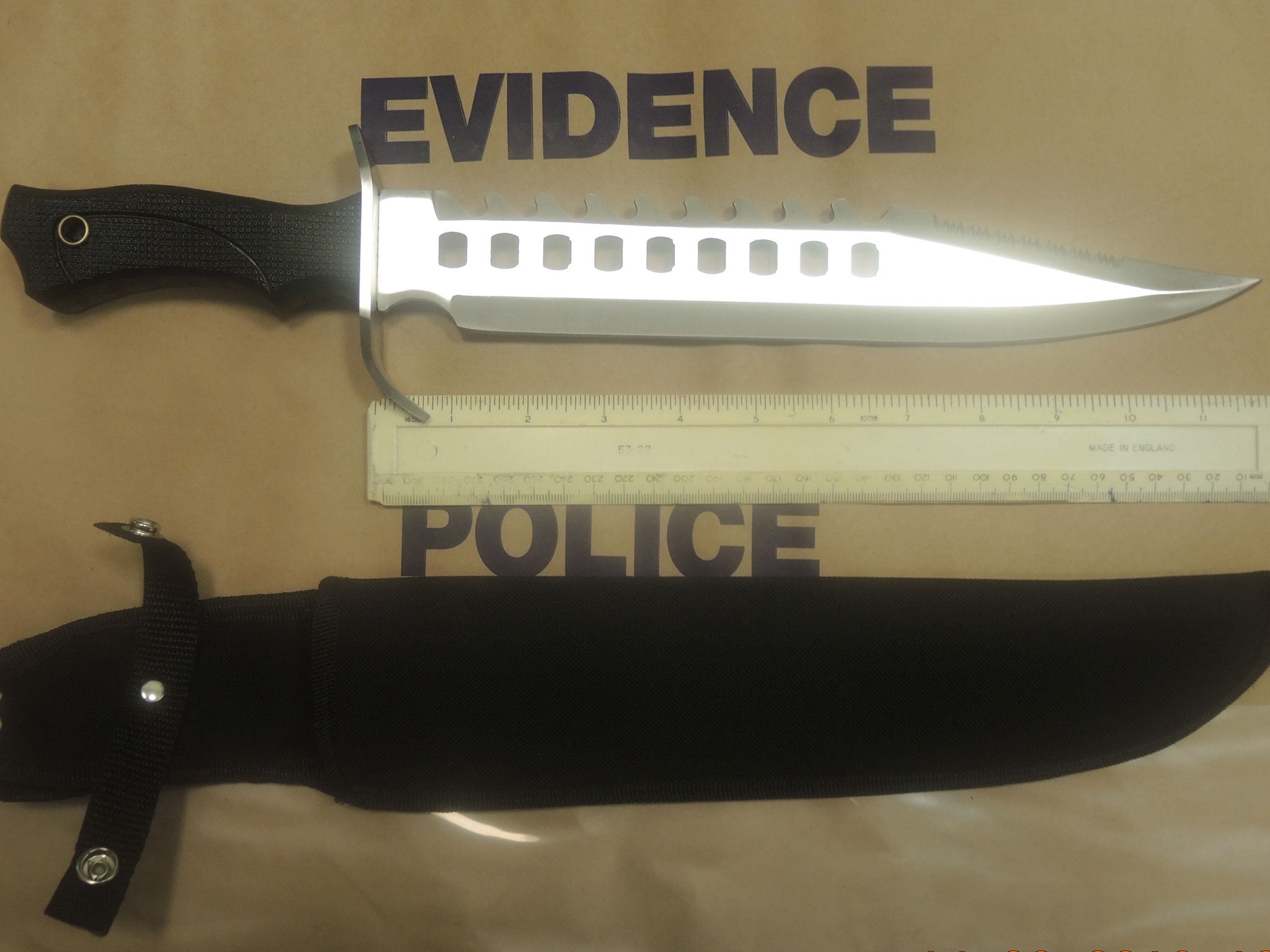Knife crime offences rise to highest level since 2010 in England and Wales
Murder detectives warn that investigations are being made harder by social media

Knife crime has risen to the highest level since 2010 in England and Wales, new figures have revealed as police say stabbing investigations are being made harder by social media.
In the year to June, more than 21,100 offences were dealt with by the criminal justice system, seeing perpetrators jailed, given community orders or cautioned.
Statistics released by the Ministry of Justice showed around two thirds of offences are possession of a blade, followed by possession of an offensive weapon and threatening someone with a knife or offensive weapon.
Three-quarters of offenders were being convicted for the first time, making them more likely to escape prison, while repeat offenders were jailed in the majority of cases.
Overall 36 per cent of knife and offensive weapon crimes offences resulted in an immediate prison sentence – the highest proportion on record – and just 11 per cent a caution.
Rory Stewart, the justice minister, said: “Knife crime is horrifying – it causes catastrophic damage to families with tragic consequences. We need sentences that punish anyone who commits knife crime and deters anyone from doing it in the future.
“These figures show we are catching and prosecuting more of those carrying a blade, and we are sending them to prison for longer.
“But we will continue to do more and through the government’s Serious Violence Strategy, we are also working to prevent young people from ever picking up a knife in the first place.”
The strategy, which outlines intensified prevention work, cited potential drivers of a nationwide increase in violent crime including the “county lines” drug trade and incitement on social media.
But it was heavily criticised for omitting a leaked Home Office document saying government funding cuts to the police may have “encouraged” offenders amid the loss of more than 20,000 police officers since 2010.
Some senior police officers have also raised concern that a dramatic fall in the use of stop and search has emboldened offenders to carry knives in the belief they will not be discovered.
The decline is now starting to reverse at the call of the government and police leaders, who say the spread of body-worn cameras has causing the number of complaints to fall and reassured officers fearing racism accusations.
The mayor of London has dedicated another 122 officers to the capital’s Violent Crime Taskforce, which was launched in April in the wake of a spate of stabbings and shootings.
Speaking to journalists on Thursday, senior murder detectives said the murder rate had slowed from a peak around Easter, where the figure for London briefly overtook that in New York.
But 2018 could still set a grim record after the milestone of 100 murders was reached at the earliest point in the year since 2008, with a fatal arson in Greenwich.
Detective Chief Superintendent Richard Wood, head of homicide at Scotland Yard, said he could not predict what the toll could be by the end of the year.
“I’m confident that we are suppressing the level of violence generally, and that’s what ultimately leads to murders,” he added.
“I’m concerned that it looks a bit more frenzied that we have perhaps seen. There is clearly some very violent cases and we have got some where there are groups undertaking the attacks.”
More than 60 per cent of this year’s killings in London were stabbings and the other killings including other forms of assault, shootings, strangulation and arson.
Just over half of the killings have taken place in public places and the rest in people’s homes, leaving 76 male victims and 24 female victims dead. A total of 40 were under 25 and the remainder over.
The Metropolitan Police have so far classified 22 homicides as gang-motivated and 21 as domestic abuse.
Detectives said the time needed to bring cases to trial was getting longer because of the huge amount of data they need to examine on phones and social media use.
To gain information that is not held on devices in the UK, police must send letters of assistance to social media companies and other authorities abroad, with varying success.
Det Ch Sup Wood said “a lot of work” was underway to speed up the process, which is currently taking up to 18 months.
“The reality is more and more of everyone’s lives and therefore more and more evidence we need is existing in the virtual rather than physical world,” he added.
“There are a lot of people working really hard to try and get us to a better place but it will remain a challenge for some time.”
The officer said online evidence “doesn’t have any boundaries”, describing how social media companies based in one country can be holding the information on servers in another.
“Social media will come into play one way or another when identify what caused it or we are looking to understand the victim and suspects,” he added, following several murders linked to incitement on platforms including Snapchat.
Police have been calling on the government to increase the funding given to stretched forces responding to an increase in violence, demand and the terror threat.
Speaking to officers at a national conference this week, the home secretary Sajid Javid vowed to fight for more money in a government-wide spending review.
